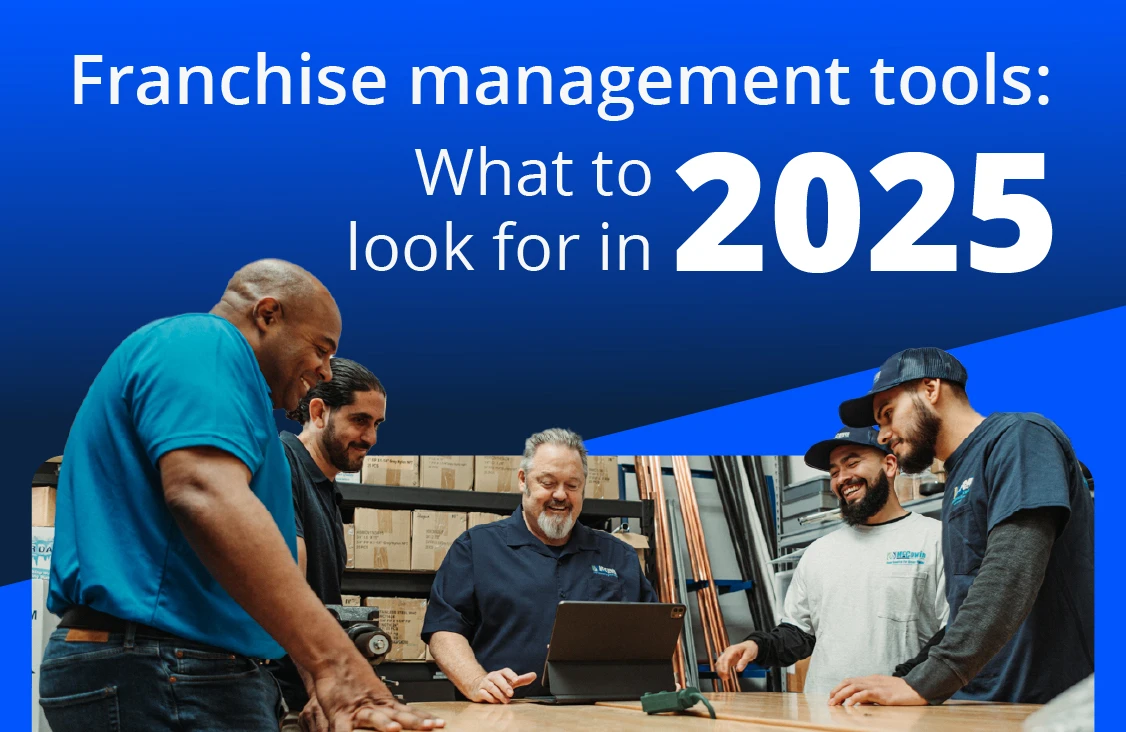
Have you ever dreamed of scaling a field-service business into a multimillion-dollar (or even billion-dollar) empire?
Growing a blue-collar business doesn’t happen overnight. Much like the nature of blue-collar work, it requires getting your hands dirty and investing a lot of hard work to see the results you’ve dreamed of.
That’s why we’ve rounded up the best leadership advice from blue-collar millionaires and successful blue-collar entrepreneurs to help you better understand the path to success and how to get there.
In this article, we’ll unpack what constitutes a blue-collar worker; the values associated with blue-collar employees; and the most valuable pieces of leadership advice from successful entrepreneurs so you can take your business to the next level.
What is a Blue-Collar Worker?
Simply put, blue-collar workers perform manual labor as part of their profession. Historically, this class of workers was synonymous with highly-skilled trade jobs.
Today, the most common industries that employ blue-collar workers include:
- Construction
- Manufacturing
- Plant operations
- Waste disposal
- Plumbing
- Custodial
- Warehousing
- Shipping
- Technical installations
- Sanitation
- Landscaping
- Food processing
- Recycling
- Mining
A number of blue-collar industries still center around traditional trade jobs, but, as you can see from the list above, the field of blue-collar work has evolved to include manual labor professions of all skill levels.
Moreover, these wide-ranging industries now present overwhelming opportunity for financial growth in today’s market. In fact, a new study reports that there are 804,000 available blue-collar jobs, which is significantly higher than the 738,000 workers qualified for those jobs.
With the blue-collar labor shortage, now is the time for leaders and entrepreneurs in the space to hone their managerial skills. To lead employees, inspire them, and spur business development, it’s important to first understand what motivates blue-collar employees.
Common Values
Understanding common blue-collar values is the first step in enhancing your leadership skills. Knowing your workers’ motivations can help you understand what your employees need and why, and can also inform decisions you make about your business.
Typically, blue-collar workers value:
- Honesty
- Strong work ethic
- Shared moral code
- Sense of community
- Collaboration
These values can inform your communication style, management style, workplace environment, and overall culture. For example, if you need to have a tough conversation with an employee, take a straightforward approach and avoid skirting around the issue at hand. Because blue-collar workers typically value honesty, this feedback and conversation will resonate more with the employee than if you had sugarcoated the issue.
11 Leadership Lessons from Blue-Collar Entrepreneurs
Now that you’ve taken the time to understand what constitutes a blue-collar worker and their more characteristic values, it’s time to see how other blue-collar millionaires and entrepreneurs have made their way to success.
1. Create a vision with your team.
When it comes to blue-collar work, collaboration is key. Not only is it a fundamental blue-collar value, but it is also a crucial element of success at every stage of your business.
Mark Stoner, president of Ashbusters Chimney Service, recognizes this and recommends injecting collaboration into the vision development process of your business.
He states, “A successful way to secure your vision is to involve your team. Show your team where the company is going and more importantly, where they are going within it, by asking them what they want out of it. When a vision is supported by all team members, that visions chance of becoming a reality is greatly increased.”
2. Instill good values in your people.
Beyond co-creating your vision with your team, the founders of Home Depot, Bernie Marcus and Arthur Blank, urge leaders to focus on instilling quality values in their workers.
In their novel, Built from Scratch: How a Couple of Regular Guys Grew the Home Depot from Nothing to $30 Billion, they mention, “We’re only as good as our people–especially the men and women working in our stores every day. If the front line isn’t absolutely committed to the cause, we can’t win. That’s why we believe a sure way of growing this company is to clearly state our values and instill them in our associates. Values are beliefs that do not change over time; they guide our decisions and actions. They are the principles, beliefs, and standards of our company. We call this process of enculturation “breeding orange.”
Consider clearly stating your company values in multiple locations. Whether that’s on your company website, in the office, or even out in the field, having your values explicitly stated in a place where employees can regularly see them will increase the likelihood that they become encultured and truly committed to your business and vision.
3. Don’t make excuses.
One thing that Mack Story, author of Blue Collar Leadership, knows is that creating a blue-collar business empire is not easy.
It’s going to take dedication, manpower, and lots and lots of hours put in before you realize your end goal.
But don’t let the process discourage you. Story urges, “When you think of why you’re stuck, don’t make excuses. Excuses are like exits when you’re traveling along the highway to success.”
Rather than making excuses or dwelling on what’s stalling your progress, make a game plan and identify actionable solutions to the problems you’re facing.
4. Failure is a temporary condition.
After nearly thirty years, Brian Scudamore saw his junk hauling company, 1-800-GOT-JUNK?, do an average of a million dollars a day. Today, he sees a clear pathway for his company to become a billion-dollar entity. But, this wasn’t always the case. For Scudamore, accepting failure early on in his career opened the doorway to success.
In his professional years Scudamore learned, “You can do something big, too, if you want. But you’ve got to be willing to fail. Failure is a temporary condition. Afterward, it is a lesson learned. It is wisdom gained.”
Instead of harping on his shortcomings, Scudamore learned to take his failures in stride. He approached each as a learning lesson that propelled him into the success he enjoys today.
5. Go with your gut.
Peter Warhurst, president and CEO of PODS, cautions against overanalyzing in business.
“Don’t get analysis paralysis,” he says. “Don’t get too bogged down in trying to overanalyze it. You’ve come up with an idea, and your gut and instincts tell you it’s a good idea, be willing to take the risk. But monitor the decisions you make and be willing to admit when you made a bad one and change it and fix it.”
One of the ways Warhurst exercises his instincts, is by placing trust in the staff members he’s hired to make good decisions. Rather than overthinking it, he takes solace in the fact that he has chosen talented people. He then empowers those employees to make decisions, which ends up preventing a decision-making bottleneck in the organization.
6. Serve the community.
As we mentioned earlier, blue-collar workers value a strong sense of community. They crave meaningful relationships with their families, communities, and colleagues.
Maria Rios, owner of Nation Waste, acknowledges the importance of community in the blue-collar work field and used her commitment to those around her as a catalyst for prosperity.
After seeing the devastation caused by hurricanes Katrina and Ike in Houston, Rios chose to emulate the lessons she learned growing up and dedicate her business to helping the Houston community.
She states, “It all goes back to the lessons I learned on our farm about running a small business and paying it forward. If you practice what you preach and give back to your community, you will be enriched and rewarded.”
Today, Nation Waste is valued at $30M dollars, with up to 26 trucks and 41 employees.
7. Look forward, not backward.
Perspective is important when you’ve got your nose to the grindstone, day in and day out trying to scale your field-service business into an empire.
Boyce Muse, the King of Concrete, realized this early on in his career. He now advises: “See life looking forward through the windshield and not looking in the rearview mirror all the time.”
Looking forward to the future and focusing on your vision can prevent you from slipping into the pitfalls of the past. With your eyes consistently on the goal you want to achieve for your business, the easier it will be for you to find ways to accomplish that dream.
8. Go forward with passion.
“Passion is what separates me from everyone else, and I’m passionate because I believe. Nothing great has ever been built by someone lacking passion. So I created passion inside my head, inside my heart and refused to lose,” says Roy Holt, founder and CEO of Two Maids & A Mop.
Holt makes an interesting point. Much like instilling key values in your employees, it’s also important to instill a sense of passion in your business. When you believe in your vision; your people; and the product or service you’re providing to the market, others will start to catch on.
9. Always ask for advice.
Lee Haight, president of Roofing Professionals, connects his success to always seeking advice from the talented people he surrounds himself with.
He explains, “Constantly improving the people you seek counsel from is literally the biggest cheat code to success I know.”
To open yourself up to a myriad of learning opportunities, try connecting with other entrepreneurs through social media, attending leadership conferences, or organizing a local entrepreneurial meet-ups to expand your counsel contacts.
10. Don’t be afraid of doing “too much.”
If you’ve ever wondered if you’re going overboard with the dedication and hard work you’re putting into your vision, remember this advice from Scott Selzer, founder and CEO of Arcadia Louvered Roofs (which is estimated to achieve $3.7M annual revenue): “When you start out and people tell you you’re doing too much, you know you’re doing the right thing! If you bring together the best product, the best people, and the best process, you’re going to win every time.”
Bringing passion, drive, and commitment to your work will trickle down to the employees you serve and the product or service you offer the market. The amount of effort you put in will not only been seen by your employees but will also be felt by the consumers you serve.
11. Challenge yourself.
Christina Clark, franchise owner of Molly Maid, a Neighborly Company, has been able to join Molly Maid’s coveted “Million Dollar Circle” not by being complacent with her success, but by repeatedly challenging herself throughout her career.
She states, “Going into business for myself has given me the opportunity to grow and learn about myself. It has increased my confidence. I have had to learn how to deal with new challenges. Without overcoming some of your fears, it limits your full potential and thus, my experience in pursuing business ownership has helped make me a more confident person.”
By stepping outside of your comfort zone and facing your fears in business, you’ll start to see that some of your preconceived limits are self-imposed and you are capable of much more than you ever imagined.
Other advice from prominent blue-collar entrepreneurs
You don’t have to be a blue-collar millionaire to offer sound leadership advice. That’s why we’ve compiled helpful advice from other successful blue-collar entrepreneurs that you can apply to your business, below.
Take risks.
Going off of Clark’s point, Darpan Munjal, CEO and founder of Squadhelp, espouses staying away from your comfort zone.
He shared with us, “Take risks! Often times, we get caught up in our security nets of what we are comfortable with and what we know, but if we aren’t uncomfortable, we aren’t learning!
Everyone is hyper focused on failing and the ‘what if’s’ of business, but that doesn’t push you or your business forward. “What if I fail?” “What if my idea flops?” If those are constantly running through your head and stopping you from taking a leap of faith regarding your business, rethink your strategy. Celebrate your success, but also celebrate the failures that come your way as well. As silly as it sounds, failing is the only way to understand how to grow individually and professionally.”
When you take a business risk, monitor the outcome of that risk. Whether the result is positive or negative, you can learn from the aftermath of the risk and determine how to move forward with your business or what to avoid in the future.
Don’t ask your employees to do something you wouldn’t do yourself.
Lisamarie Monaco, mother of 5 and founder of her own life insurance company, saw success from putting in the hard work right alongside her employees.
She told us, “My advice to becoming the best leader in your new venture or business would be: do not ask of your employees what you would not do yourself. Put the work in with them. Guide them. They are who is helping your business be a success and helping you to be successful. Their growth is your growth!”
Help your employees grow by investing in training and ongoing education opportunities. This development at all levels of the company can lead to increased motivation, loyalty, and better quality work.
Make sure your team understands their objectives.
Chuck Naish, owner of City Residential Foundation Repair, has been in the home repair and maintenance industry for almost 20 years. From his time in the industry, he’s gathered a lot of advice, but one piece of advice that stands out in particular centers around daily objectives.
He shared with us, “Another important aspect of being a leader is making sure your team understands the daily objectives. As the leader, that’s your job to do so. A way you can get your team excited to do their best work is to have morning meetings and provide incentives for rewarding their good work.”
Regular communication and incentivization is a great strategy for keeping employees motivated and engaged. By setting clear guidelines for what’s expected and rewarding exceptional work, you’ll avoid employee confusion and increase the likelihood that excellent work is delivered every day.
Help employees see their future clearly.
As a ditch digging business owner with over 200 employees, Ken Rusk knows that one of the biggest challenges in blue collar business is finding and maintaining talented employees.
He shared with us that in his 30 plus years in business, he’s learned that “people stick around and grow and develop within your company for a few simple reasons: They want to SEE their individual futures clearly. They want to FEEL as though they can get that future with you. And they want a company culture that makes them feel as though they are in full CONTROL of that outcome.”
Take the time to develop growth plans and professional development paths for your employees. Clearly identify their future opportunities in digestible, incremental timelines (such as monthly, quarterly, yearly timelines) and work with them to realize those opportunities.
Lesson learned
There is no one way to succeed as a leader in a blue-collar industry. But by understanding who your workers are, what they value, and the tips other successful entrepreneurs have used to chart their own success, you’ll be able to enhance your own leadership skills and take your business to the top.
Looking to save time within your company so you can focus on further leadership development? Discover Housecall Pro’s digital toolbox for field service professionals. We’ve helped thousands of professionals operate their businesses more efficiently by automating tedious tasks. From estimating software and online booking to dispatch software and invoicing, Housecall Pro offers you the tools necessary for freeing up valuable time for business owners.
If you’re a carpet cleaning, floor cleaning, tile & grout cleaning, or window cleaning company, book a demo with Housecall Pro now to receive 50% off your first 3 months.







